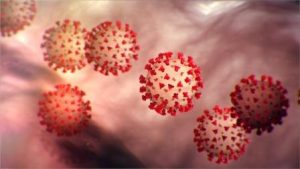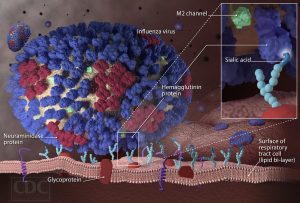 CDC today confirmed another infection with Coronavirus Disease (COVID-19) in the United States. The patient is among a group of people under a federal quarantine order at JBSA-Lackland in Texas because of their recent return to the U.S. on a State Department-chartered flight that arrived on February 7, 2020.
CDC today confirmed another infection with Coronavirus Disease (COVID-19) in the United States. The patient is among a group of people under a federal quarantine order at JBSA-Lackland in Texas because of their recent return to the U.S. on a State Department-chartered flight that arrived on February 7, 2020.
As the disease continues to spread, according to Johns Hopkins data, there are now upward of 60,300 confirmed cases with nearly 1,400 deaths tied to the new virus.
All people who lived or travelled in Hubei Province, China, are considered at high risk of having been exposed to this virus and are subject to a temporary 14-day quarantine upon entry into the United States. This is the first person under quarantine at JBSA-Lackland who had symptoms and tested positive for COVID-19. The individual is currently isolated and receiving medical care at a designated hospital nearby.
This brings the total number of COVID-19 cases in the United States to 15. There will likely be additional cases in the coming days and weeks, including among other people recently returned from Wuhan. While 195 people were discharged from quarantine on Tuesday, more than 600 people who returned on chartered flights from Wuhan remain under federal quarantine and are being closely monitored to contain the spread of the virus.
For the latest information on the outbreak, visit CDC’s Novel Coronavirus 2019 website.
The Kentucky Department for Public Health (DPH) has received reports of two laboratory-confirmed influenza cases, indicating the presence of flu activity in Kentucky. The cases were from Jefferson County.
Beginning in October, DPH officials will begin to report weekly influenza activity to the Centers for Disease Control and Prevention (CDC) as part of statewide flu surveillance efforts.

Photo: CDC
Adequate supplies of flu vaccine are expected to be available for this year’s season. This season, only injectable influenza vaccine formulations will be distributed in the United States. Vaccination can be given any time during the flu season.
“Getting the flu can be debilitating and sometimes life-threatening, and vaccination is the best tool we have to prevent illness. It’s also extremely important to take simple preventive steps to avoid it,” said Hiram C. Polk, Jr., M.D., commissioner of DPH. “You should also follow the advice your parents gave you to prevent flu and other illnesses that tend to circulate at this time of year – wash your hands frequently, cover your mouth when you cough or sneeze and stay home when you’re sick.”
The CDC Advisory Committee on Immunization Practices recommends flu vaccine for all individuals aged six months of age and older. People who are strongly encouraged to receive the flu vaccine because they may be at higher risk for complications or negative consequences include:
• Children aged six months through 59 months;
• Women who are or will be pregnant during the influenza season;
• Persons 50 years of age or older;
• Persons with extreme obesity (Body Mass Index of 40 or greater);
• Persons aged six months and older with chronic health problems;
• Residents of nursing homes and other long-term care facilities;
• Household contacts (including children) and caregivers of children aged ≤59 months
(i.e., aged aged ≥50 years;
• Household contacts and caregivers or people who live with a person at high-risk for
complications from the flu; and
• Health care workers, including physicians, nurses, and other workers in inpatient and
outpatient-care settings, medical emergency-response workers (e.g., paramedics and
emergency medical technicians), employees of nursing home and long-term care
facilities who have contact with patients or residents, and students in these professions
who will have contact with patients.
Infection with the flu virus can cause fever, headache, cough, sore throat, runny nose, sneezing and body aches. Flu can be very contagious. For more information on influenza or the availability of flu vaccine, Kentuckians should contact their primary care medical provider or local health department. Influenza information is also available online at https://www.cdc.gov/flu/index.htm.
 In one of her first official site visits since taking the helm of the Centers for Disease Control and Prevention in Atlanta, Dr. Anne Schuchat met with public health officials in Kentucky to discuss various programs and policies impacting the state’s public health system. Dr. Schuchat, CDC’s acting director, participated in day-long activities with staff from the Department for Public Health (DPH), within the Cabinet for Health and Family Services (CHFS), related to Kentucky’s opioid and drug overdose epidemic as well as sessions dealing with health data and analytics.
In one of her first official site visits since taking the helm of the Centers for Disease Control and Prevention in Atlanta, Dr. Anne Schuchat met with public health officials in Kentucky to discuss various programs and policies impacting the state’s public health system. Dr. Schuchat, CDC’s acting director, participated in day-long activities with staff from the Department for Public Health (DPH), within the Cabinet for Health and Family Services (CHFS), related to Kentucky’s opioid and drug overdose epidemic as well as sessions dealing with health data and analytics.
“I appreciate the chance to learn from the partnerships and programs that Kentucky has established to tackle the opioid epidemic and other public health challenges, said Dr. Schuchat, following her visit to Kentucky. “Hearing from people from public health, academia, coalitions, and public safety made a strong impression on me of the crucial role that partnerships play in protecting people’s health in Kentucky.”
“We were tremendously honored to host Dr. Schuchat in Kentucky today and greatly appreciate her time and invaluable insights into the American public health system,” said CHFS Secretary Vickie Yates Brown Glisson. “The opioid epidemic is the number one public health crisis facing Kentucky. It is extremely beneficial for us to be able to share information and collaborate with CDC leadership on these issues as we work toward building a healthier state.”
Dr. Schuchat began her public health career in 1988 when she came to CDC as an Epidemic Intelligence Service officer. She was principal deputy director of CDC during 2015-2017 and director of CDC’s National Center for Immunization and Respiratory Diseases from 2006-2015. She was promoted to Rear Admiral in the Commissioned Corps of the United States Public Health Service in 2006 and earned a second star in 2010. Dr. Schuchat was elected to the National Academy of Medicine (formerly the Institute of Medicine) in 2008.
Dr. Schuchat has played key roles in a number of CDC emergency responses. Most notably, she served as Chief Health Officer for CDC’s 2009 H1N1 pandemic influenza response; led the CDC team responding to the SARS outbreak in Beijing in 2003; and supported the Washington D.C. field team during the 2001 bioterrorist anthrax response.
“She has a unique overview of medicine and health in America and strong ideas about public health as an important profession,” said DPH Commissioner Dr. Hiram C. Polk, Jr.
The sessions were held in DPH. Sec. Glisson, Deputy Secretary Judge Timothy Feeley, DPH Commissioner Dr. Hiram Polk and public health experts from across the Commonwealth got a chance to speak with the acting director about Kentucky’s relationship with the CDC and her plans for the agency.
 Weather
Weather Traffic
Traffic @LouisvilleDispatch
@LouisvilleDispatch @LouisvilleDisp
@LouisvilleDisp Subscribe
Subscribe